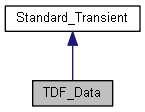This class is used to manipulate a complete independent, self sufficient data structure and its services:
More...
|
| | TDF_Data () |
| | A new and empty Data structure.
|
| |
| const TDF_Label | Root () const |
| | Returns the root label of the Data structure.
|
| |
| Standard_Integer | Transaction () const |
| | Returns the current transaction number.
|
| |
| Standard_Integer | Time () const |
| | Returns the current tick. It is incremented each Commit.
|
| |
| Standard_Boolean | IsApplicable (const Handle< TDF_Delta > &aDelta) const |
| | Returns true if <aDelta> is applicable HERE and NOW.
|
| |
| Handle< TDF_Delta > | Undo (const Handle< TDF_Delta > &aDelta, const Standard_Boolean withDelta=Standard_False) |
| | Apply <aDelta> to undo a set of attribute modifications.
|
| |
| void | Destroy () |
| |
| | ~TDF_Data () |
| |
| Standard_Boolean | NotUndoMode () const |
| | Returns the undo mode status.
|
| |
| Standard_OStream & | Dump (Standard_OStream &anOS) const |
| | Dumps the Data on <aStream>.
|
| |
| Standard_OStream & | operator<< (Standard_OStream &anOS) const |
| |
| void | AllowModification (const Standard_Boolean isAllowed) |
| | Sets modification mode.
|
| |
| Standard_Boolean | IsModificationAllowed () const |
| | returns modification mode.
|
| |
| void | SetAccessByEntries (const Standard_Boolean aSet) |
| | Initializes a mechanism for fast access to the labels by their entries. The fast access is useful for large documents and often access to the labels via entries. Internally, a table of entry - label is created, which allows to obtain a label by its entry in a very fast way. If the mechanism is turned off, the internal table is cleaned. New labels are added to the table, if the mechanism is on (no need to re-initialize the mechanism).
|
| |
| Standard_Boolean | IsAccessByEntries () const |
| | Returns a status of mechanism for fast access to the labels via entries.
|
| |
| Standard_Boolean | GetLabel (const TCollection_AsciiString &anEntry, TDF_Label &aLabel) |
| | Returns a label by an entry. Returns Standard_False, if such a label doesn't exist or mechanism for fast access to the label by entry is not initialized.
|
| |
| void | RegisterLabel (const TDF_Label &aLabel) |
| | An internal method. It is used internally on creation of new labels. It adds a new label into internal table for fast access to the labels by entry.
|
| |
| const TDF_HAllocator & | LabelNodeAllocator () const |
| | Returns TDF_HAllocator, which is an incremental allocator used by TDF_LabelNode. This allocator is used to manage TDF_LabelNode objects, but it can also be used for allocating memory to application-specific data (be careful because this allocator does not release the memory). The benefits of this allocation scheme are noticeable when dealing with large OCAF documents, due to:
|
| |
| void | DumpJson (Standard_OStream &theOStream, Standard_Integer theDepth=-1) const |
| | Dumps the content of me into the stream.
|
| |
 Public Member Functions inherited from Standard_Transient Public Member Functions inherited from Standard_Transient |
| | Standard_Transient () |
| | Empty constructor.
|
| |
| | Standard_Transient (const Standard_Transient &) |
| | Copy constructor – does nothing.
|
| |
| Standard_Transient & | operator= (const Standard_Transient &) |
| | Assignment operator, needed to avoid copying reference counter.
|
| |
| virtual | ~Standard_Transient () |
| | Destructor must be virtual.
|
| |
| virtual const opencascade::handle< Standard_Type > & | DynamicType () const |
| | Returns a type descriptor about this object.
|
| |
| Standard_Boolean | IsInstance (const opencascade::handle< Standard_Type > &theType) const |
| | Returns a true value if this is an instance of Type.
|
| |
| Standard_Boolean | IsInstance (const Standard_CString theTypeName) const |
| | Returns a true value if this is an instance of TypeName.
|
| |
| Standard_Boolean | IsKind (const opencascade::handle< Standard_Type > &theType) const |
| | Returns true if this is an instance of Type or an instance of any class that inherits from Type. Note that multiple inheritance is not supported by OCCT RTTI mechanism.
|
| |
| Standard_Boolean | IsKind (const Standard_CString theTypeName) const |
| | Returns true if this is an instance of TypeName or an instance of any class that inherits from TypeName. Note that multiple inheritance is not supported by OCCT RTTI mechanism.
|
| |
| Standard_Transient * | This () const |
| | Returns non-const pointer to this object (like const_cast). For protection against creating handle to objects allocated in stack or call from constructor, it will raise exception Standard_ProgramError if reference counter is zero.
|
| |
| Standard_Integer | GetRefCount () const noexcept |
| | Get the reference counter of this object.
|
| |
| void | IncrementRefCounter () noexcept |
| | Increments the reference counter of this object.
|
| |
| Standard_Integer | DecrementRefCounter () noexcept |
| | Decrements the reference counter of this object; returns the decremented value.
|
| |
| virtual void | Delete () const |
| | Memory deallocator for transient classes.
|
| |
This class is used to manipulate a complete independent, self sufficient data structure and its services:
Access to the root label;
Opens, aborts, commits a transaction;
Generation and use of Delta, depending on the time. This class uses a special allocator (see LabelNodeAllocator() method) for more efficient allocation of objects in memory.

 Public Member Functions inherited from Standard_Transient
Public Member Functions inherited from Standard_Transient